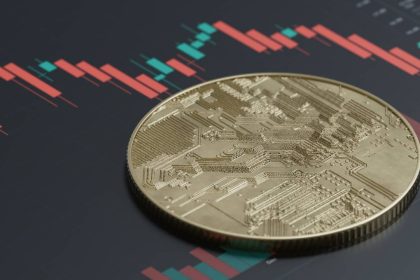Will Taylor Swift get engaged in 2024? Will JD Vance be replaced as veep nominee? Despite its questionable legality, hundreds of millions in crypto are being wagered on events like these on Polymarket.
By Nina Bambysheva, Forbes Staff
What are the chances that Vice President Kamala Harris will defeat former President Trump in November? On a blockchain-based website called Polymarket, Harris’s chances, according to the thousands betting, are put at 39%, while Trump’s are at 59%, with Michelle Obama and RFK Jr. at 1%. Will JD Vance be replaced as Trump’s VP nominee? A $100 bet will return $1,000 if Vance bows out.
Welcome to the future of betting markets, where nearly anything can be wagered on, from bitcoin’s peak price in 2024 to the speed at which Trump and Biden climb stairs, to the sex of Hailey and Justin Bieber’s new baby. On Polymarket, some $446 million is currently being wagered on the outcome of the presidential election in November. Never mind that in the United States betting on the outcome of elections is prohibited, according to the Commodities and Futures Trading Commission, which deems it against the public interest. Polymarket, whose headquarters is in New York City, is a prediction market phenom, thanks largely to the world’s current obsession with American politics.
Launched in 2020, Polymarket has already surpassed $650 million in trading volume this year, with nearly $300 million in July alone, according to data from Dune Analytics. The platform is expected to process $1 billion in wagered predictions before the year is over. Campaign managers and political analysts now turn to this unconventional oracle, seeking clues in the fluctuating market prices. Even former President Donald Trump has touted his Polymarket odds on his social media app, TruthSocial.
Though blockchain technology isn’t necessary for this type of application, Polymarket uses a network called Polygon, which operates 24/7 and sits atop Ethereum, where transactions cost fractions of the chain’s normal fees. However, instead of US dollars, customers who want to make trades on Polymarket use the dollar-based stablecoin USDC. But even that is changing. Last Wednesday, Polymarket announced it is enabling users to pay for their bets using bank transfers and credit cards through a partnership with Miami-based MoonPay.
The prediction marketplace’s soaring popularity has convinced top-tier investors, including Peter Thiel’s Founders Fund and Ethereum cofounder Vitalik Buterin, to back the startup with funding totaling $74 million. Currently, markets tied to U.S. elections, of which there are more than 100, are driving most of trading volume on Polymarket. These are supposedly off-limits to U.S. residents, though 25% of the website’s traffic comes from the U.S., according to web analytics platform Similarweb. Polymarket’s 26-year-old founder, Shayne Coplan, won’t say much about his team’s efforts to prevent U.S.-based users from betting on elections. He prefers to emphasize his platform’s strengths.
“Polymarket effectively takes what otherwise would be an Internet yelling match and turns that into a market where the person who’s right wins. We want our forecast to become ubiquitous and mainstream,” says Coplan from Polymarket’s posh penthouse office in New York City’s Soho.
Raised in Manhattan by his NYU film professor mother, Coplan says he was an Internet nerd. At 14, he was experimenting with building a cryptocurrency mining rig, and in 2014 he participated in the Ethereum presale (when the price of ether was roughly 30 cents). Coplan studied computer science at NYU but dropped out during his second semester in 2017. “I was living an isolated life reading obsessively and trying new things,” he says about his next three years.
As the world plunged into uncertainty during the pandemic lockdown in 2020, Coplan began exploring Polymarket’s predecessors like Ethereum-based prediction market Augur, which ICO’ed in 2015 but never really gained traction. Eventually, he began developing his own prediction platform. “I wanted to know the likelihood of New York City opening back up, if the vaccine was going to be ready by then, if restaurants would open again,” recalls Coplan. “It was so difficult to find a signal in the noise and that is exactly what information markets or prediction markets are best at.” Polymarket’s first event market was a small wager about when New York City would reopen.
Coplan’s seed funding of $4 million came a few months later, in October 2020, and was led by another crypto wunderkind, Olaf Carlson-Wee, founder of crypto hedge fund Polychain Capital. “We’ve been fascinated with information markets for some time, but many solutions in the space have been plagued with UX [user experience] and liquidity problems,” said Carlson-Wee at the time. “Shayne and his team understand this deeply and have incorporated these learnings into their inventive, user-centric product approach.” Carlson-Wee declined to comment for this article.
Prediction markets operate on a fairly simple all-or-nothing premise: if your prediction is correct, you profit. If not, you lose funds. In these markets, the price of a “share” reflects the odds of an event occurring, ranging from $0.00 to $1.00. Currently, on Polymarket, a share for Donald Trump winning the presidential election costs 59 cents, meaning the market assigns him a 59% probability of winning. And if he prevails in November, that bet returns $1.00.
“Prediction markets are a powerful force to counter misinformation,” wrote Marc Bhargava, managing director at General Catalyst who personally invested in Polymarket’s seed round, in a statement to Forbes. General Catalyst also led Polymarket’s Series A round. “They are fueled by people putting their money where their mouth is to back the most accurate sentiments.”
Because Polymarket is built on a distributed ledger, it claims to offer greater efficiency and transparency than its centralized counterparts such as Kalshi and PredictIt, which are based in New York City and Wellington, New Zealand respectively. The application relies on what is called a decentralized oracle called UMA, or “Universal Market Access,” a blockchain-based system that settles disputes through token-based voting. Once an event is resolved, smart contracts automatically distribute payouts to the winning shareholders.
The blockchain-powered app isn’t flawless. In June, Polymarket bettors staked over $1 million on whether Donald Trump’s 18-year-old son, Barron Trump, was involved in the launch of memecoin DJT (the former president’s initials), which has a self-reported market capitalization of roughly $80 million. Initially, odds favored his involvement at 60%, but they quickly dropped as sufficient evidence failed to materialize. UMA’s voters ultimately settled the market in favor of those who wagered that Barron was not involved. Despite this outcome, Polymarket interceded, raised questions about the vote, and eventually overruled UMA saying that Barron Trump was involved “in some way.” The website wound up refunding holders of the “yes” side of the contract who had lost money.
“Some people dismiss prediction markets because of events like this,” said Polymarket’s investor Nick Tomaino, founder and general partner of crypto-focused investment firm 1Confirmation, on the Unchained podcast. “I think this is foolish because this stuff is still being ironed out.”
P olymarket’s surge in election-related volume isn’t just due to good timing. According to Art Malkov, Polymarket’s first CMO and cofounder of influencer marketing platform Lever.io, the company has invested significant amounts in influencer marketing, including promotions with Reddit channel WallStreetBets, which has helped Polymarket gain traction among retail investors.
Coplan leads a team of some 30 people worldwide who curate users’ suggestions and scour the internet for trending topics that can be turned into betting markets. There are more than 300 markets on Polymarket today, falling under seven categories: Politics, Olympics, Crypto, Pop Culture, Sports, Business and Science. All employees are required to read Austrian economist Friedrich Hayek’s “The Use of Knowledge in Society” as well as works of George Mason University economics professor Robin Hanson, best known for creating the concept of futarchy, a form of governance in which decisions are made based on betting markets.
Polymarket doesn’t charge fees, and Coplan remains elusive about how the platform will generate revenues, but hints that fees are coming. “We’re focused on growing the marketplace right now and providing the best user experience,” he says. “We’ll focus on monetization later.”
Despite the lack of revenues, and some nagging questions concerning the source of Polymarket’s trading volume, young Coplan is the darling of Silicon Valley. He is “dynamic, brilliant,” gushed billionaire venture capitalist Tim Draper in a written comment to Forbes. “Using the word ‘tenacious’ to describe entrepreneurs feels overdone, but for Shayne, it is 100% true,” adds Tom Schmidt, general partner at crypto-focused venture firm Dragonfly. “It takes true grit, passion, and vision to spend as many years as Shayne has building Polymarket… but these qualities are what it takes to build a once-in-a-generation company.” Ethereum’s cofounder Vitalik Buterin, has personally invested and promoted Polymarket in public appearances and on X.
“Shayne is a young man in a hurry, but in a hurry to do things properly,” says Chris Giancarlo, former CFTC chairman and chair of Polymarket’s advisory board, which earlier this month added election forecasting guru Nate Silver. “There’s a generational aspect to Polymarket’s success story,” he adds. “An older generation of Americans that didn’t grow up with the type of events markets that you see in Europe, I think, perhaps don’t quite understand the value proposition but young people are not going to refrain from these marketplaces because the elders tell them to do so.”
Prediction markets can be traced back to the 16th century, when Europeans would sometimes bet on the papal successor. In the late 19th century, prediction marketplaces thrived as “bucket shops,” where bets on stock prices were placed. Over time, these markets evolved into more sophisticated platforms, especially with the rise of the Internet. The University of Iowa’s Tippie College of Business began experimenting with so-called political stock markets via its Iowa Electronic Markets in the late 1980s. The platform allows users to make small wagers on political outcomes, economic indicators, and cultural events in the name of research.
The United States government has always been wary of gambling, and as a result, prediction markets have faced legal challenges. Because they resemble futures contracts, these markets fall under the oversight of the Commodity Futures Trading Commission (CFTC).
In January 2022, the CFTC ordered Polymarket to pay a civil penalty of $1.4 million for operating in the U.S. without a registration. As part of the settlement, the company promised to wind down services in the U.S. while continuing to operate abroad.
Users in the United States aren’t technically permitted to place bets on the website, but 25% of Polymarket’s website visitors are based in the U.S. The next four most represented countries: Canada 6.3%, Netherlands 6%, Vietnam 5.9% and Mexico 5%, according to data from Similarweb. Before the CFTC settlement, U.S. traffic share ranged between 34% and 54%. Coplan would not comment on Polymarket’s geoblocking efforts, though one former employee who spoke with Forbes on the condition of anonymity says the company “does everything it possibly can to fend off users who aren’t supposed to trade on the platform.” Still, workarounds including the use of virtual private networks, which mask a user’s location, may account for some of the U.S. activity on Polymarket.
Competitor PredictIt has been operating in the U.S. since 2014 as part of a collaboration with Victoria University of Wellington in New Zealand under a no-action letter from the CFTC, allowing it to function as a “data-gathering tool for academic researchers.” PredictIt also allows U.S. election bets—it currently places Trump’s odds at 52% and Kamala Harris’s at 49%. It charges a 10% fee on profit and limits investment in any individual contract to a maximum of $850 at any one time so volumes are much lower than Polymarket’s: $31 million is wagered on the outcome of the elections compared to $446 million in bets on Polymarket. In August 2022, the CFTC withdrew its no-action letter and ordered PredictIt to cease operations; the marketplace is still operating while challenging the decision in court. Its clearing firm, Aristotle, is also pursuing a registration for a fully regulated venue. “We’ve operated legally in the United States for 10 years, under no-action relief and expect to operate another 10 years or more,” says John Aristotle Phillips, PredictIt’s founder and CEO.
Another competitor, CFTC-regulated Kalshi, can’t offer election bets but offers wagers on government-related events, such as the Federal Reserve’s interest rate decisions. The platform charges small fees for orders based on the maximum potential earnings from the contract and the implied probability of making those earnings. “Kalshi is focused on continuing to build a legal and regulated prediction market in the U.S,” said CEO Tarek Mansour in a comment to Forbes.
More restrictions may be on the way. In May, the CFTC proposed a ban on contracts related to political contests, awards ceremonies, or sports events, deeming them “contrary to the public interest.” In response to Forbes’ request for comment, the agency referred to its settlement with Polymarket and stated that the comment period for the rule proposal ends on August 8.
However, on June 28, the Supreme Court ruled against a federal agency regulation concerning fishing boats in the case of Loper Bright Enterprises v. Raimondo, effectively overturning so-called “Chevron deference”, which allowed federal agencies to enforce regulations based on their own interpretations of laws that were sometimes ambiguous. As a result, agencies like the Securities and Exchange Commission (SEC) and the Commodity Futures Trading Commission (CFTC) will now face challenges to their authority. This could offer a big boost to prediction markets under pressure from the CFTC like Polymarket.
“I think the trend, longer term, will be toward acceptance of events markets,” says Giancarlo.
One big question hanging over Polymarket’s future is how it will be able to maintain its trading volume and momentum post-November 2024. Coplan and his boosters seem unconcerned. “It’s true that volumes are often driven by events like elections, but there are always major events going on and arguably more so in an increasingly volatile world. The other driver of sustained growth is a growing cohort of people eager to make predictions and see what others truly believe; this is a challenge with traditional social media and even more so with genAI given the lack of consequence for creating mass amounts of inaccurate content,” writes General Catalyst’s Bhargava.
Given the low barriers to entry in crypto, competition will be another big challenge for Polymarket. Memecoins like DJT already serve as prediction market proxies. The sector has also attracted broker-dealers like billionaire Thomas Peterffy’s Interactive Brokers, which recently announced the launch of ForecastEx, a prediction market offering contracts based on significant economic data releases like the US Fed Funds Target Rate and the US Consumer Price Index. In April, trading firm Susquehanna International, owned by billionaire Jeff Yass, set up a dedicated team to make markets on Polymarket’s competitor Kalshi.
Dragonfly’s Schmidt likes Coplan’s chances in the race to build a lasting prediction marketplace despite competition from traditional finance. “Ultimately, Polymarket’s ability to allow an ecosystem of creators to create new markets is its secret weapon, one that TradFi competitors can’t easily replicate,” he says. “Think YouTube, not TV.”
Editor’s Note: This story was updated on July 31 to clarify that General Catalyst also led Polymarket’s Series A round.
MORE FROM FORBES
Read the full article here

















